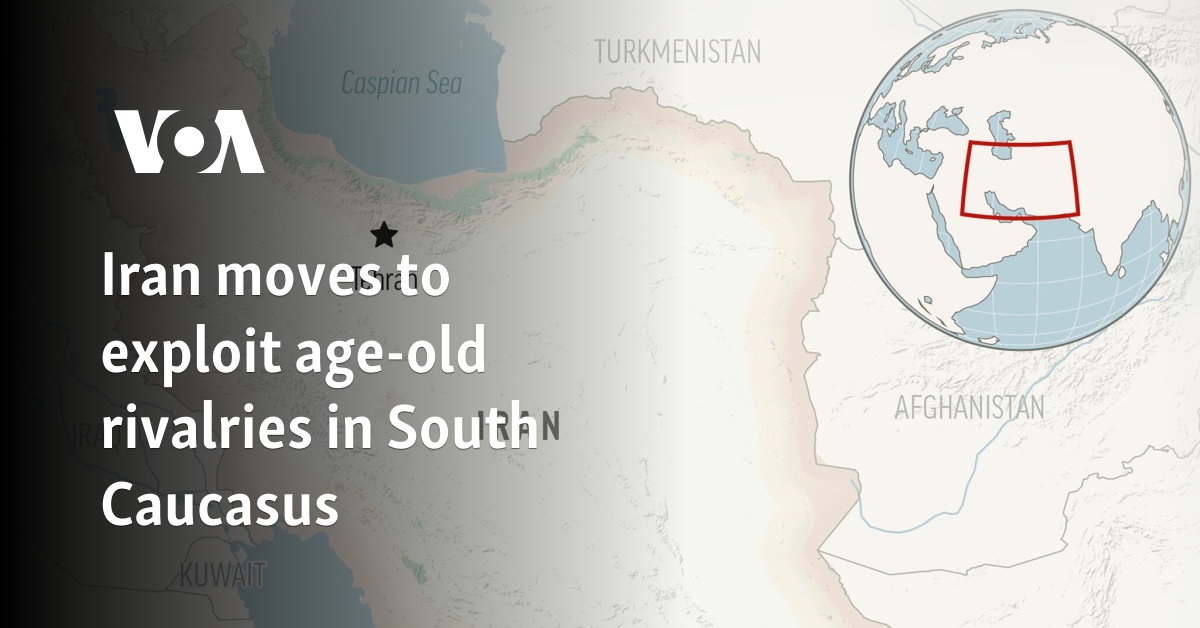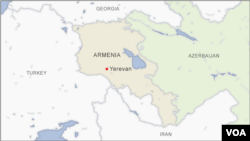While the West remains preoccupied with conflicts in Ukraine and the Gaza Strip, Iran is seizing the opportunity to expand its influence in the South Caucasus – a region where centuries-old rivalries are resurfacing.
At the end of May, Georgian Prime Minister Irakli Kobakhidze found himself at the centre of controversy when he attended the funeral of Iranian President Ebrahim Raisi. Among those attending the ceremony was Ismail Haniyeh, the Hamas leader who was assassinated in the Iranian capital Tehran on August 31.
After Raisi’s death in a helicopter crash, Mohammad Mokhber was appointed interim president of Iran. At the end of July, Masoud Pezeshkian was elected Iranian president with the official support of Iranian Supreme Leader Ali Khamenei.
According to Janatan Sayeh, a research analyst at the Washington-based Foundation for Defense of Democracies (FDD), while Kobakhidze is trying to maintain basic diplomatic relations by attending events such as Raisi’s funeral, he is taking reputational risks by having ties to figures in classified terrorist organizations such as Hamas.
“The intention behind this was to maintain diplomatic relations and support the new Iranian president at a very basic level,” Sayeh told VOA Georgian. “However, it is questionable that they are attending the same meeting as terrorists like PIJ (Palestinian Islamic Jihad) or Hamas or delegates from Hezbollah. So for many of these countries, this is a threat to their reputation.”
The Georgian president’s appearance at Raisi’s funeral, which may have been in part a deliberate affront to Washington following US criticism of his government, was also an indication that Iran’s ambitions are no longer limited to the Middle East. Indeed, Iran’s increased attention to the South Caucasus reveals a strategic attempt to intensify its rivalries with Turkey and Israel.
“Iran has definitely increased its presence and influence in the Caucasus,” Sayeh said. “It is trying its best to perform a balancing act between Armenia and Azerbaijan.”
A complex story
Once a battlefield for the Ottoman, Persian and Russian empires, the South Caucasus, due to its complex history, remains a target of competing interests for which strategic alliances are essential.
“Armenia and Azerbaijan are doing the same thing, albeit in their own way. They are trying to manage relations with Iran, Russia and Turkey,” says Aslı Aydıntaşbaş, a visiting fellow at the Center on the United States and Europe at the Washington-based think tank Brookings Institution.
“It’s a multi-vector hedging policy,” she told VOA.
The bitter rivalry between Iran and Israel also plays a role in this complicated network of alliances. For years, Israel has been one of the main suppliers of military equipment to Azerbaijan, alongside Turkey. In return, Azerbaijan supplies 40 percent of its oil needs to Israel.
On the other hand, Iran poses “a direct threat to Azerbaijan’s borders” due to its ties to certain religious institutions in Azerbaijan and its support for Armenia in the Nagorno-Karabakh war, said Sayeh of the FDD.
“Azerbaijan is in a difficult position,” he said. “But if the situation escalates, I think it is in their best interest to stay out of the direct confrontation between Iran and Israel.”
Relations between Baku and Tehran are further strained by the large Azerbaijani minority in Iran. While Turkey and Azerbaijan are accused of using this minority as leverage, “Iran is able to control its entire civil society, regardless of ethnicity,” said Sayeh.
Against this backdrop, Armenia, driven by its strained relations with Turkey and Azerbaijan, is seeking to strengthen its ties with Iran. Unconfirmed reports that Armenia has purchased $500 million worth of Iranian weapons – which both countries deny – may be an indication of Yerevan’s desperate attempt to forge new alliances.
Armenia’s formal recognition of Palestine as an independent state further strengthens Yerevan’s ties to Tehran.
“Armenia is the country that has bad relations with all three megapowers in the region, except maybe Iran,” said Brookings’ Aydintaşbaş. “And I think they don’t want to lose that advantage to Azerbaijan.”
Armenia’s search for new alliances is a response to Russia’s waning support during the Nagorno-Karabakh conflict. Russia did not support Armenia when it fought with Azerbaijan over the region in 2020 and 2023.
“The Nagorno-Karabakh war has paved the way for Iran to increase its support for Armenia,” Sayeh said.
“Because Russia is so busy with the war on its western fronts and in Ukraine, it has neither the military capacity nor the means to support Armenia as it has in the past,” Sayeh said. “This gave Iran the opportunity to make more intensive inroads into the South Caucasus.”
At the same time, Armenia’s efforts to deepen relations with the West are fraught with difficulties, Sayeh said.
“Armenia has been trying to open up its military cooperation with the West,” he said. “But given Russia’s withdrawal and the fact that Armenia is dissatisfied with the US assurances, Armenia is likely to have no choice but to buy Iranian weapons.”
Georgia’s status is uncertain
Meanwhile, the status of Georgia, once considered the most pro-Western country in the South Caucasus, is now uncertain.
“In the West, no one knows what direction Georgian politics will take,” Aydintaşbaş said. “There is a reason to be cautious until the (parliamentary) elections in Georgia (in October) and to hope that the Georgian public will choose a pro-Western direction.”
Iran’s broader strategic goal is to reduce US influence in the Caucasus while taking advantage of the limited US presence in the region.
According to Sayeh, Tehran sees opportunities to expand its sphere of influence and possibly use its relations with countries such as Georgia and Armenia to counter Western interests.
“As long as they manage to remove a country from the Western sphere or orbit, it would be a victory for the Iranian side,” Sayeh said.
“Tehran’s focus is primarily on US interests. And now Iran has the opportunity to use Georgia and Armenia and, with the appropriate Russian support, expand its access to the Caucasus front.”
Analysts agree that the ongoing conflicts in Ukraine and Gaza will have a profound impact on the evolving “Great Game” between regional powers in the South Caucasus and will shape the future dynamics of the region.
This article originally appeared in VOA’s Georgia service.



